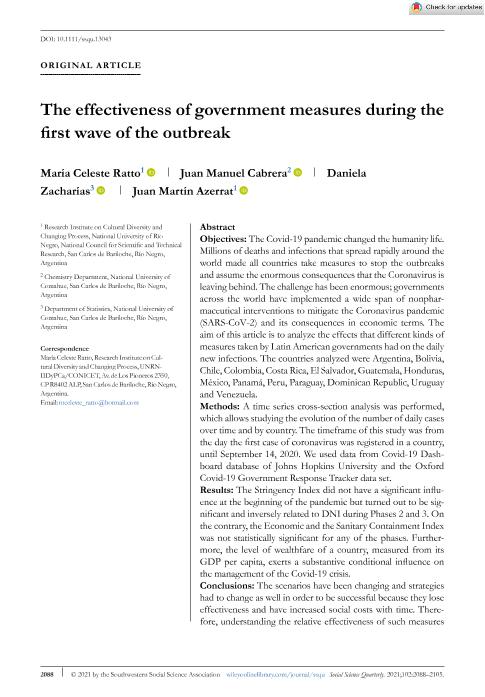Mostrar el registro sencillo del ítem
dc.contributor.author
Ratto, Maria Celeste

dc.contributor.author
Cabrera, Juan Manuel

dc.contributor.author
Zacharias, Daniela Rosa

dc.contributor.author
Azerrat, Juan Martín Inti

dc.date.available
2022-03-22T15:25:55Z
dc.date.issued
2021-08
dc.identifier.citation
Ratto, Maria Celeste; Cabrera, Juan Manuel; Zacharias, Daniela Rosa; Azerrat, Juan Martín Inti; The effectiveness of government measures during the first wave of the outbreak; John Wiley & Sons Inc.; Social Science Quarterly; 102; 5; 8-2021; 2088-2105
dc.identifier.issn
0038-4941
dc.identifier.uri
http://hdl.handle.net/11336/153741
dc.description.abstract
Objectives: The Covid-19 pandemic changed the humanity life. Millions of deaths and infections that spread rapidly around the world made all countries take measures to stop the outbreaks and assume the enormous consequences that the Coronavirus is leaving behind. The challenge has been enormous; governments across the world have implemented a wide span of nonpharmaceutical interventions to mitigate the Coronavirus pandemic (SARS-CoV-2) and its consequences in economic terms. The aim of this article is to analyze the effects that different kinds of measures taken by Latin American governments had on the daily new infections. The countries analyzed were Argentina, Bolivia, Chile, Colombia, Costa Rica, El Salvador, Guatemala, Honduras, México, Panamá, Peru, Paraguay, Dominican Republic, Uruguay and Venezuela. Methods: A time series cross-section analysis was performed, which allows studying the evolution of the number of daily cases over time and by country. The timeframe of this study was from the day the first case of coronavirus was registered in a country, until September 14, 2020. We used data from Covid-19 Dashboard database of Johns Hopkins University and the Oxford Covid-19 Government Response Tracker data set. Results: The Stringency Index did not have a significant influence at the beginning of the pandemic but turned out to be significant and inversely related to DNI during Phases 2 and 3. On the contrary, the Economic and the Sanitary Containment Index was not statistically significant for any of the phases. Furthermore, the level of wealthfare of a country, measured from its GDP per capita, exerts a substantive conditional influence on the management of the Covid-19 crisis. Conclusions: The scenarios have been changing and strategies had to change as well in order to be successful because they lose effectiveness and have increased social costs with time. Therefore, understanding the relative effectiveness of such measures had on the disease spreading during the first wave of the outbreak, could help governments to make more informed decisions about how to control future outbreaks of the Covid-19 pandemic.
dc.format
application/pdf
dc.language.iso
eng
dc.publisher
John Wiley & Sons Inc.

dc.rights
info:eu-repo/semantics/openAccess
dc.rights.uri
https://creativecommons.org/licenses/by-nc-sa/2.5/ar/
dc.subject
COMPARATIVE POLITICS
dc.subject
CORONAVIRUS
dc.subject
COVID-19
dc.subject
GOVERNMENT RESPONSES
dc.subject
LATIN AMERICA
dc.subject
NONPHARMACEUTICAL INTERVENTIONS
dc.subject
PUBLIC POLICIES
dc.subject.classification
Ciencia Política

dc.subject.classification
Ciencia Política

dc.subject.classification
CIENCIAS SOCIALES

dc.title
The effectiveness of government measures during the first wave of the outbreak
dc.type
info:eu-repo/semantics/article
dc.type
info:ar-repo/semantics/artículo
dc.type
info:eu-repo/semantics/publishedVersion
dc.date.updated
2021-12-13T19:20:57Z
dc.identifier.eissn
1540-6237
dc.journal.volume
102
dc.journal.number
5
dc.journal.pagination
2088-2105
dc.journal.pais
Estados Unidos

dc.description.fil
Fil: Ratto, Maria Celeste. Consejo Nacional de Investigaciones Científicas y Técnicas. Centro Científico Tecnológico Conicet - Patagonia Norte. Instituto de Investigaciones en Diversidad Cultural y Procesos de Cambio. Universidad Nacional de Río Negro. Instituto de Investigaciones en Diversidad Cultural y Procesos de Cambio; Argentina
dc.description.fil
Fil: Cabrera, Juan Manuel. Universidad Nacional del Comahue; Argentina. Consejo Nacional de Investigaciones Científicas y Técnicas; Argentina
dc.description.fil
Fil: Zacharias, Daniela Rosa. Universidad Nacional del Comahue; Argentina
dc.description.fil
Fil: Azerrat, Juan Martín Inti. Consejo Nacional de Investigaciones Científicas y Técnicas. Centro Científico Tecnológico Conicet - Patagonia Norte. Instituto de Investigaciones en Diversidad Cultural y Procesos de Cambio. Universidad Nacional de Río Negro. Instituto de Investigaciones en Diversidad Cultural y Procesos de Cambio; Argentina
dc.journal.title
Social Science Quarterly
dc.relation.alternativeid
info:eu-repo/semantics/altIdentifier/url/https://onlinelibrary.wiley.com/doi/10.1111/ssqu.13043
dc.relation.alternativeid
info:eu-repo/semantics/altIdentifier/doi/http://dx.doi.org/10.1111/ssqu.13043
Archivos asociados
